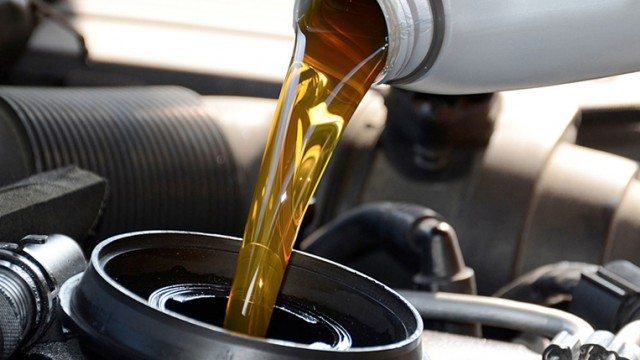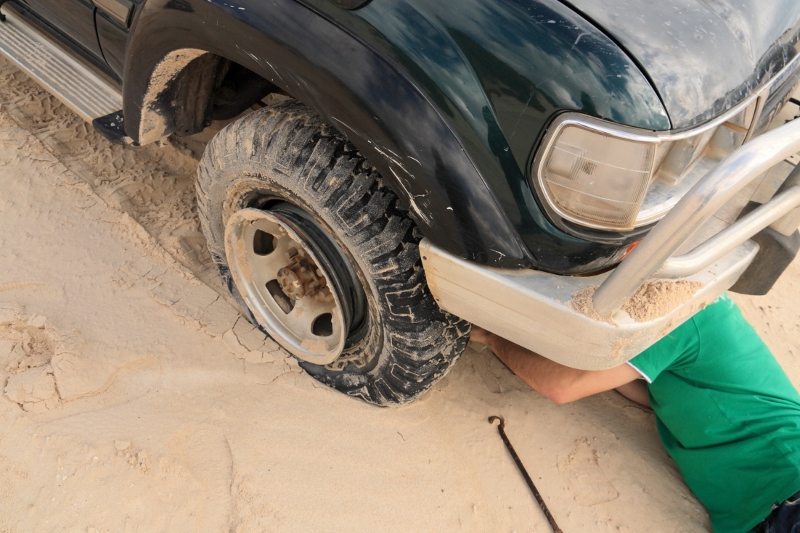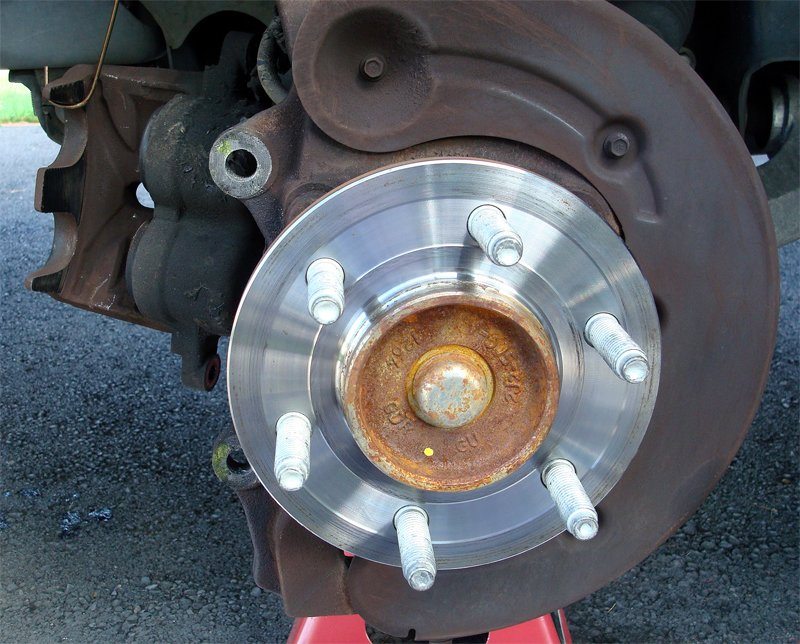A 4WD minor service is generally quicker than a major service. Although the types of services generally varies depending on the vehicle’s make and model, it typically takes around 90 minutes to 2 hours to finish. In this article, we will walk you through the most common services that are considered as part of a minor service.
Who else wants to know what should be included in your 4WD Minor Service

Replacement Of Engine Oil And Oil Filter
Most car manufacturers recommend replacing your oil filter at every oil change. Others suggest changing the oil filter after two consecutive oil changes. Ideally, you should change your oil every 5,000 km to 10,000 km, or every 3 to 6 months—whichever comes first. To ensure optimal vehicle performance, always check your manual for the manufacturer’s recommended schedule for a 4WD minor service.
Check & Top-up of All Fluids
There are different types of fluids that play an important role in keeping your 4WD running smoothly. A 4WD minor service often includes checking these essential fluids and topping them up as needed to prevent damage and ensure optimal performance. Below are five important vehicle fluids that are commonly inspected and refilled during a 4WD minor service:
-
Coolant – This fluid regulates your vehicle’s temperature and is usually found in a clear overflow plastic container near the radiator. Your 4WD’s coolant level must not drop below the minimum line.
-
Transmission Fluid – It lubricates, cools, and cleanses the internal parts of the transmission while maintaining the necessary pressure for smooth gear shifts. A dipstick is typically used to check the level and refill it when needed.
-
Power Steering Fluid – This hydraulic fluid powers your vehicle’s steering system. It is usually located in a small tank near the firewall at the base of the windshield.
-
Windscreen Washer Fluid – Essential for cleaning the windshield when using wipers, this fluid should always be kept full for safe driving.
-
Engine Oil – This oil lubricates and protects the internal components of your engine. You can check it using a dipstick and follow the manufacturer’s recommendations for proper oil levels and replacement schedules.
A regular 4WD minor service ensures that all these fluids are at optimal levels, helping to maintain your vehicle’s reliability and extending its lifespan.
Check & Top-up of All Fluids
There are several types of fluids that play an essential role in keeping your 4WD running smoothly. A 4WD minor service typically includes checking these fluids to ensure they are at the correct levels and topping them up as needed. Below are five crucial vehicle fluids that are often inspected and replenished during a minor service:
-
Coolant – This fluid regulates your vehicle’s temperature and is usually located in a clear overflow plastic container near the radiator. Your 4WD’s coolant level should never be below the minimum line.
-
Transmission Fluid – It lubricates, cools, and cleanses the internal parts of the transmission while maintaining the necessary pressure for proper operation. A dipstick is commonly used to check transmission fluid levels and refill when required.
-
Power Steering Fluid – A hydraulic fluid that provides the power for your vehicle’s steering system. It is generally located in a small tank near the firewall at the base of the windshield.
-
Windscreen Washer Fluid – This fluid is used to clean the windshield when operating the wipers. Ideally, your windscreen washer fluid should always be full.
-
Engine Oil – Essential for lubricating and protecting the internal components of your engine. You can check engine oil levels with a dipstick and should follow the manufacturer’s recommendations in your owner’s manual for maintaining the correct amount.
Regularly checking and topping up these fluids during a 4WD minor service ensures your vehicle remains reliable and performs at its best.

Check & Top-up of Tyre Pressure & Spare
Check your tyre pressure, including the spare, regularly to ensure the optimum performance of your 4WD. It’s generally recommended to check your tyre pressure before going on a long drive, once every 2 to 4 months, or as often as needed. Use an accurate tyre pressure gauge to measure the pressure, and adjust it according to the recommended levels stated in your user manual. For off-road driving, such as on sand, the recommended tyre pressure is typically between 10 psi and 16 psi. Regular tyre checks are often part of a 4WD minor service, helping maintain safety and performance.
Check & Cleaning of Air Filters & Cabin Air Filter
Air filters, including cabin air filter, should be cleaned every 1 to 3 months. Replacement of air filters should be done every 2 to 3 years, or after 25,000 km to 50,000 km, depending on driving conditions.
Check Fuel Filter & Fuel Lines
The fuel filter removes impurities that can prevent your car from running smoothly. A clogged filter reduces the vehicle’s performance and increases fuel consumption. A failing fuel line can lead to strong fuel odors, engine misfires, and reduced power. Most manufacturers recommend replacing fuel filters and lines every 2 years or after 35,000 km to 40,000 km, but this can vary depending on the make and model. Checking and replacing these components is often part of a 4WD minor service to ensure reliable performance.

Check Brakes & Clutch Systems
The brake and clutch systems are vital to your vehicle’s safety, so they must be maintained regularly—typically every 10,000 km to 15,000 km, or once to twice a year. Regular maintenance ensures that the braking and clutch power remain at their best, fluid levels are sufficient, pressure is correctly set, and all components work properly. A failing clutch system can cause difficulty when changing gears, while a failing brake system may produce grinding noises, a burning smell, an overly hard or soft brake pedal, or cause the vehicle to pull to one side when braking. Inspecting these systems is an essential part of a 4WD minor service to ensure safety and reliable performance.
Clear Service Warning Lights
A service warning light acts as a reminder that your vehicle is due for a maintenance check. These lights can be cleared and reset every time you have your maintenance completed. A 4WD minor service will also include resetting these service warning lights, ensuring your vehicle is up-to-date and ready for the road.
Adjust Handbrake Where Applicable
A handbrake, also known as a parking brake or emergency brake, is a crucial safety feature designed to keep the vehicle stationary. It can also act as an emergency brake when needed. Over time, handbrakes may become too stiff or too loose, requiring adjustment to ensure proper functionality. This adjustment is typically carried out during a 4WD minor service to maintain safety and reliability.

Check Steering & Suspension
The steering and suspension systems work together to keep your wheels firmly in contact with the ground and to prevent the vehicle from veering to one side of the road. When these components start to fail, you may notice unusual shaking of the vehicle or sudden, unpredictable changes in direction. To ensure safety and smooth handling, it’s recommended to have your steering and suspension checked and maintained regularly, typically every 10,000 km. These inspections and adjustments are often included as part of a 4WD minor service.
Lube All Doors
Rust can develop on car door hinges and latches over time, affecting their smooth operation. To prevent this, they should be regularly lubricated using white lithium grease, motor oil, or silicone spray. This preventive maintenance is also part of a 4WD minor service, helping to keep your vehicle’s components in good condition.
Check Automotive Battery & Charging
Your 4WD’s battery needs to be checked regularly to ensure your vehicle is powered efficiently. A fully charged automotive battery typically measures 12.6 volts or higher. Checking the battery condition, including its charging capacity, is usually part of a 4WD minor service to prevent unexpected breakdowns and ensure reliable performance.
Check All Electrics
Checking all your vehicle’s electrics is essential to ensure everything is secure and functioning properly. Common issues with the electrical system include a bad starter, damaged alternator, loose wires, short circuits, low battery charge, and blown fuses. As part of a 4WD minor service, all electrics are typically inspected to ensure your vehicle remains safe, reliable, and efficient.
Safety Check & Full Report
A safety check and full report cover the major safety components of your vehicle, many of which are subject to legal compliance. This inspection includes both interior and exterior assessments of key components such as tyres, steering, suspension, exhaust, vehicle battery, brakes, clutch, engine, and fluid levels. After the safety check, you’ll receive a detailed report on your vehicle’s condition. This process is typically part of a 4WD minor service, ensuring that your vehicle remains roadworthy and compliant.
If you need further advice, or for a certified technician to assess your 4×4 minor service, call us on (07) 3269 3158 or reach out to us. We are located 113 Connaught Street Sandgate QLD 4017. Feel free to visit us at any time.
